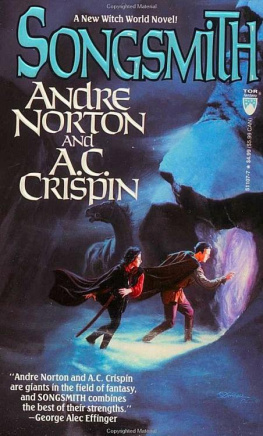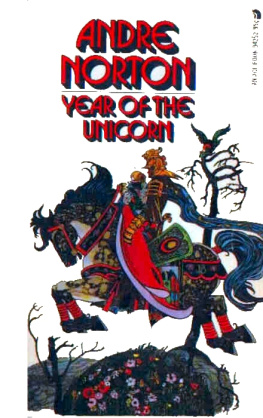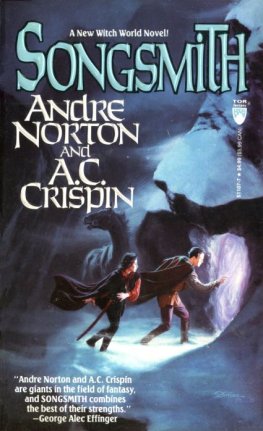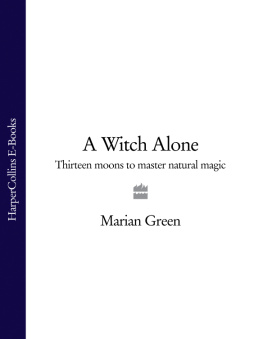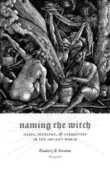Songsmith
Andre Norton
And
A. C. Crispin
CONTENTS
Prologue
Life as a songsmith, a forger and singer of tales, seems to the uninitiated (that is, those who have never tried it) to be a most carefree existence, full of travel, romance and perhaps (only now and then, for spice) a little danger. In truth, it seldom reaches such memorable heights, being mostly work like unto any other.
One listens, one remembers, then one wrestles with words and musical notes to hammer all into a coherent whole, hoping fervently that the finished product will elicit smiles instead of frowns, or, worse, yawns. One learns to count the nights takings from the clinks in the harp case, discerning the clear ring of silver from the thud of bronze and copper or (fortune be praised) the weighty, rare whisper of gold-all by sound alone. One spends nights huddled under the lash of rain, or stinging snow, with perhaps naught but a pocket of sullen fire to hold back the hungry night. One learns to heat brook water and sip it slowly in lieu of real food, trying thus to fool an empty belly...
No, my lords and ladies, gathered here in this age-held citadel to hear the songsmith and sip your wine, the life of a bard is hardly carefree.
There are times, though, when the music and the tale are worth it all. Then the tune flows like the ripple of a fine horses mane, words spring nearly unbidden to the singers lips. Such a time is now, following the toasts and congratulations that accompany a day of ceremony, high feasting and joy, here in such a lordly keep. Now, after the singing of some of the oldest, best tales, it is time for the birth of a new one... a tale that songsmiths will hold in special honor, for reasons soon to be made clear to you.
So ... an opening chord-sweep, a strum to mimic the sound of wind harrying a cold, early spring mist in the backwater alley of a darkened waterfront, and the new tale opens...
One
Years of salt spray borne by fierce winds had encrusted the walls guarding the steep lane leading up from the wharves, painting dirty white splotches on the age-blackened stones. The Way of the Empty-Netted Fisher was nearly deserted in the last wan illumination of sunset; only one of its many shadows possessed any substance.
That dark-cloaked, slight figure was already so unsteady from two months at sea that when a bitter cold, salt-tinged blast swept by, it staggered, nearly falling. The hapless wayfarer skidded on the slimy cobbles of the stinking, refuse-covered Way, only saved from a fall by the tall, gryphon-headed quarterstaff that served as a walking aid as well as a weapon. The traveler huddled into the half-shelter of an ancient archway to brace against another gust of wind, long-fingered hands clutching a worn hand-harp case and a much-mended backpack against the icy thrust of the coming storm.
Ahead a dim light beckoned, promising shelter from the wind and soon-to-fall sleet. As the harper neared that flickering beacon, it revealed itself to be a ships lantern, barely sheltered enough that its flame still lived, hanging outside a hulking, dark-timbered building. Even above the whipping breeze, sounds of tipsy revelry inside were clear.
The traveler eyed the inn with its accompanying tavern warily, realizing that The Dancing Dolphin was no accommodation that anyone with a reasonably well-filled purse would seek out for a meal, much less lodging. Beneath the much-faded lettering on the swinging sign, an improbable greyish shape sported among wildly tossing waves. The harper grimaced, but there was no arguing with the light weight of the purse carefully tucked down inside a sea-stained leather jerkin.
Forcing the door open against a particularly strong windbluster, the songsmith stumbled into the taproom. Raucous laughter and shouted arguments made a deafening din. Eyeing the tavern-master, the dark-cloaked traveler picked a cautious way across a floor made nearly as treacherous as the alley outside by slopped wine and greasy, skittering bones.
The tavern-master, a thin, red-nosed man with a balding pate and hair-tufted ears, turned at the tug on his sleeve. Your pardon, sir, the stranger murmured, indicating the hand-harp case. Would there be any objection to a few songs by the fire for your customers tonight?
The tavern-masters eyes were on a level with the harpers as he eyed the stranger; then, abruptly, he nodded. Not as long as youre willing to pay for your bed and board like anyone else, minstrel.
Certainly. The stranger shook back the hood of the dark cloak, revealing a mass of curling black hair, cropped short. Small silver hoops winked from both earlobes, Ill begin
A wench! An a likely-looking one at that, Mylt! By the Hounds Teeth, whered you find er? A hand descended on the travelers shoulder, jerking her half about to face a heavy-shouldered fisherman with a wind- and ale-reddened face.
His rough handling pulled her dark cloak open, revealing the silver ornament lying pendant on the breast of her laced overjerkin. As the man took in the meaning of that symbol, he stepped back, dropped his hand. I didnt know-didnt see- Clumsily, he touched thick fingers to his forehead in apology. Yer pardon, songsmith...
The bard graciously inclined her head, her fingers going to the sign of her calling ... three interlinked circles, each with a flattened, pointed side-stylized finger and thumb picks, for use with a hand-harp. Ill begin now, she said to the tavernmaster, as though the interruption had not occurred.
Carrying her harp case over to the bench by the fire, the songsmith opened it, drawing forth a much-used instrument. It was of old-fashioned design, carved from aged cherry wood, its scrolls and frets enhanced by a silvery blue metal shimmering faintly in the firelight. Resting the harp across her lap, she drew three picks out of the inner pocket of her red tunic, slipping them onto her thumb and first two fingers.
She began tuning the instrument. Hearing the soft strains, the twelve fishermen, eight Sulcar sailors and two grizzled old Falconer marines present in the common room ceased talking and quietly, respectfully, gathered near the fire.
Draw nigh, sirs! Mylt the tavern-master loudly urged. Pay heed to a wandering songsmith who has graciously agreed to provide us with entertainment this stormy eve. Give heed to the Lady- He hesitated, realizing hed neglected to ask the bards name, and she whispered, with a wry smile, Lydryth of Kar Garudwyn.
... the Lady Lydryth of Kar Garudwyn! Mylt finished with a flourish. A polite silence fell.
Lydryth began playing, a rollicking, toe-tapping tune, limbering her fingers while sizing up her audience. All male, and most of them sailors or fishermen. Sea-songs would go well, then, tales of lost loves, of sweet-voiced sirens and of noble deeds. Perhaps a bawdy one to finish, making them laugh, even as they tossed coins into her harp case...
Give heed, kind sirs, to a tune taught me aboard the Sulcar ship Osprey, she said, hoping fervently that the cold dampness of this days sailing had not thickened her voice. It concerns a force of men gathered by one of your legendary heroes during the Kolder War, one Simon Tregarth. I give you The Riving of the Border.
Lydryth began singing, softly at first; then, as her voice warmed up, her contralto rang out, filling the smoke- thickened air with clear, true notes:
We pledged fair Estcarps bounds to hold
We men who ride with Tregarths band
That witches might, with knowledge old,
Avenge the wrongs done in our land.
Of Falconer blood and elder race
We ride, united by one will-
To keep the invaders from this place;
Send sword and falcon forth to kill!
As she finished the second verse and began the third, the young woman glanced quickly from face to face. Her audience was leaning forward, all conversation forgotten. Tension eased from her as she realized that the people here in the Port of Eslee were equally susceptible to the spell cast by flying fingers and trained voice as were the folk overseas in High Hallack or her home in spell-shrouded Arvon. She hoped theyd be as generous with their coin offerings; it had taken nearly everything shed earned on her travels through the Dales to pay for the long voyage aboard the Osprey.
Next page
